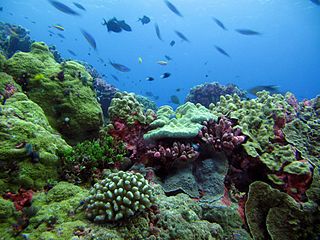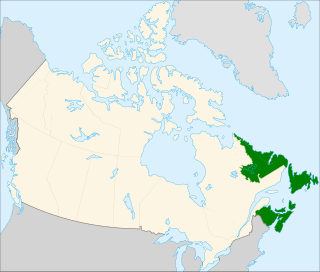
Salmon is the common name for several species of ray-finned fish in the family Salmonidae. Other fish in the same family include trout, char, grayling and whitefish. Salmon are native to tributaries of the North Atlantic and Pacific Ocean. Many species of salmon have been introduced into non-native environments such as the Great Lakes of North America and Patagonia in South America. Salmon are intensively farmed in many parts of the world.
The Canadian Broadcasting Corporation, branded as CBC/Radio-Canada, is a Canadian federal Crown corporation that serves as the national public broadcaster for both radio and television. The English- and French-language service units of the corporation are commonly known as CBC and Radio-Canada respectively, and both short-form names are also commonly used in the applicable language to refer to the corporation as a whole.

Paul Franklin Watson is a Canadian-American marine wildlife conservation and environmental activist, who founded the Sea Shepherd Conservation Society, an anti-poaching and direct action group focused on marine conservation and marine conservation activism; a group accused of Eco-terrorism by both the Japanese government and Greenpeace. He is a citizen of Canada and the United States.
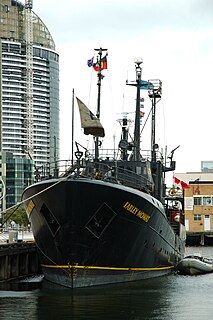
RV Farley Mowat was a long-range, ice class ship. Originally built as a Norwegian fisheries research and enforcement vessel, she was purchased by the Sea Shepherd Conservation Society in Edinburgh, Scotland, in August 1996. She is named after Canadian writer Farley Mowat. Her previous name with the group was Ocean Warrior.

Citytv Saskatchewan is a Canadian English language cable television channel in the province of Saskatchewan. Headquartered in the provincial capital of Regina, the channel is owned by Rogers Media and operates as an owned-and-operated station of its Citytv television network. Its studios are shared with CBC's Regina studios on 2440 Broad Street in downtown Regina.

The Kermode bear, also known as the spirit bear, is a rare subspecies of the American black bear living in the Central and North Coast regions of British Columbia, Canada. It is the official provincial mammal of British Columbia. While most Kermode bears are black, there are between 100 and 500 fully white individuals. The white variant is most common on three islands in British Columbia, where 10–20% of bears are white. Kermode bears hold a prominent place in the oral traditions of the indigenous peoples of the area. They have also been featured in a National Geographic documentary.

The Atlantic Philanthropies (AP) is a private foundation created in 1982 by Irish-American businessman Chuck Feeney. The Atlantic Philanthropies focuses its giving on health, social, and politically liberal public policy causes in Australia, Bermuda, Ireland, South Africa, the United States and Vietnam. It is among the largest foreign charitable donors in each of the countries in which it operates, and is the single largest funder of programs that encourage the civic engagement of older people and of comprehensive immigration reform in the United States. With the single largest advocacy grant ever made by a foundation, the Atlantic Philanthropies committed $27 million to win passage of the Affordable Care Act in the United States. About half of the Atlantic Philanthropies' grants have been made in donations that allow lobbying.

The Crop Trust, officially known as the Global Crop Diversity Trust, is an international nonprofit organization which works to preserve crop diversity in order to protect global food security. It was established through a partnership between the United Nations Food and Agriculture Organization and CGIAR acting through Bioversity International.

The Sacred Headwaters is a subalpine basin in northern British Columbia, Canada, that is the source of three wild salmon rivers: the Skeena River, Nass River and Stikine River. It is also referred to as the Klappan Valley, although the Klappan—a tributary of the Stikine River—is only one of the area's watersheds. Local Tahltan people call the area Klabona, which is loosely translated as "headwaters."

The aquaculture of salmonids is the farming and harvesting of salmonids under controlled conditions for both commercial and recreational purposes. Salmonids, along with carp, and tilapia are the three most important fish species in aquaculture. The most commonly commercially farmed salmonid is the Atlantic salmon. In the U.S. Chinook salmon and rainbow trout are the most commonly farmed salmonids for recreational and subsistence fishing through the National Fish Hatchery System. In Europe, brown trout are the most commonly reared fish for recreational restocking. Commonly farmed nonsalmonid fish groups include tilapia, catfish, sea bass, and bream.
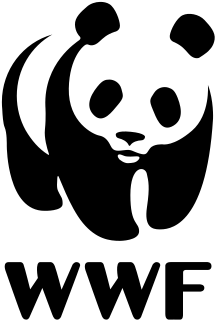
The World Wide Fund for Nature (WWF) is an international non-governmental organization founded in 1961, working in the field of the wilderness preservation, and the reduction of human impact on the environment. It was formerly named the World Wildlife Fund, which remains its official name in Canada and the United States.
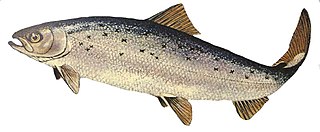
AquAdvantage salmon is a genetically modified (GM) Atlantic salmon developed by AquaBounty Technologies in 1989. A growth hormone-regulating gene from Pacific Chinook salmon, with a promoter gene from ocean pout, were added to the Atlantic salmon's genes. These two genes enable the GM salmon to grow year-round instead of only during spring and summer. The stability of the new DNA construct was tested. It revealed no additional mutational effects during insertion other than the two desired genes. These GM fish were back-crossed to wild-type Atlantic salmon, and the genetically modified EO-1ɑ gene sequence was identical in the second through fourth generations, indicating that the insertion is stable..
The Atlantic Salmon Federation (ASF) is an international conservation organization established in 1948.
The Center for Media and Democracy (CMD) is a progressive nonprofit watchdog and advocacy organization based in Madison, Wisconsin. CMD publishes PR Watch, SourceWatch, and ALECexposed.org.
The Canadian federal budget for fiscal year 2012–13 was presented to the House of Commons of Canada by Finance Minister Jim Flaherty on 29 March 2012. Among the most notable elements of the federal budget were changes to Old Age Security and a reduction of the budget for the Canadian Forces and the Canadian Broadcasting Corporation.

Salmon population levels are of concern in the Atlantic and in some parts of the Pacific. Salmon fishery stocks are still abundant, and catches have been on the rise in recent decades, after the state initiated limitations in 1972. Some of the most important Alaskan salmon sustainable wild fisheries are located near the Kenai River, Copper River, and in Bristol Bay. Fish farming of Pacific salmon is outlawed in the United States Exclusive Economic Zone, however, there is a substantial network of publicly funded hatcheries, and the State of Alaska's fisheries management system is viewed as a leader in the management of wild fish stocks. In Canada, returning Skeena River wild salmon support commercial, subsistence and recreational fisheries, as well as the area's diverse wildlife on the coast and around communities hundreds of miles inland in the watershed. The status of wild salmon in Washington is mixed. Out of 435 wild stocks of salmon and steelhead, only 187 of them were classified as healthy; 113 had an unknown status, 1 was extinct, 12 were in critical condition and 122 were experiencing depressed populations.

A non-profit membership-based registered charity, the Council for the Arts in Ottawa (CAO) champions the arts as the bedrock for an engaged citizenry in a vibrant growing community. It focuses on services for its diverse membership. Through advocacy, information and advice to members, it seeks to increase public interest and support for the arts in the national capital region. Its membership includes over 200 artists and arts organizations, and individual and corporate supporters of the arts.
The Trans Mountain Pipeline System, or simply the Trans Mountain Pipeline, is a pipeline that carries crude and refined oil from Alberta to the coast of British Columbia, Canada. "Trans Mountain pipeline system" and "Trans Mountain Expansion Project", TMX, are since August 31, 2018, part of a new "Trans Mountain Corporation", a wholly owned subsidiary of the Canada Development Investment Corporation, that is accountable to the Parliament of Canada. Up to this date, it was owned by the Canadian division of Kinder Morgan Energy Partners. The pipeline has been in use since 1953. It is the only pipeline to run between these two areas.
Karen Ludwig is a Canadian Liberal politician who was elected to represent the riding of New Brunswick Southwest in the House of Commons of Canada in the 2015 federal election. She was the first woman ever to win in the riding, traditionally seen as a Conservative stronghold.

